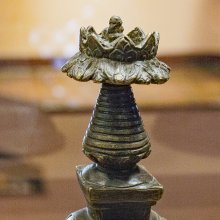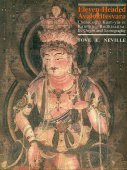Silk: 2 definitions
Introduction:
Silk means something in the history of ancient India, Hindi. If you want to know the exact meaning, history, etymology or English translation of this term then check out the descriptions on this page. Add your comment or reference to a book if you want to contribute to this summary article.
Images (photo gallery)
(+8 more images available)
India history and geography
Source: Knowledge Traditions & Practices of India: Other Technologies: A SurveySilk refers to a textile that was actively produced and exported in ancient India.—By the time trade with the Roman Empire reached its peak, India was a major exporter of textiles (e.g., Silk), specially cotton and silk. The Vedas refer to various types of garments as well as fabrics such as wool (avi, śāmulya) or silk (tarpya), also to weaving and looms. India exported cotton to China, silk to Indonesia and all the way to the Far East.
Fabrics — especially cotton and silk — often provided supports for much painted, printed or embroidered artwork (see an example left, from Gujarat), whether the resulting piece was to be worn as a sari or brocade or hung as tapestry.

The history of India traces the identification of countries, villages, towns and other regions of India, as well as mythology, zoology, royal dynasties, rulers, tribes, local festivities and traditions and regional languages. Ancient India enjoyed religious freedom and encourages the path of Dharma, a concept common to Buddhism, Hinduism, and Jainism.
Languages of India and abroad
Hindi dictionary
Source: DDSA: A practical Hindi-English dictionarySilk in Hindi refers in English to:—(nf) silk; —[ka] silken..—silk (सिल्क) is alternatively transliterated as Silka.
...
See also (Relevant definitions)
Starts with (+11): Cilku, Shilkas, Shilku, Silk cotton tree, Silk flower, Silk garment, Silk plant, Silk siris, Silk tree, Silk tree albizia, Silk weed, Silk-cotton, Silka, Silkanti, Silkasilki, Silkbark, Silkhan, Silkhun, Silkisu, Silkugan.
Ends with: Corn silk, Red silk.
Full-text (+743): Kausheya, Cinamshuka, Dukula, Shalmali, Tantukita, Apurani, Tulini, Dhautakausheya, Naramina, Ahika, Kankari, Daukula, Makhatula, Korata, Kitaja, Sujani, Cikatem, Patrorna, Kutani, Pitambara.
Relevant text
Search found 159 books and stories containing Silk; (plurals include: Silks). You can also click to the full overview containing English textual excerpts. Below are direct links for the most relevant articles:
Manusmriti with the Commentary of Medhatithi (by Ganganatha Jha)
Verse 11.168 < [Section XVIII - Expiation for Theft (steya)]
Verse 5.119 < [Section XIII - Purification of Substances]
Verse 8.399 < [Section XLVIII - Laws relating to Civic Misdemeanours]
Vinaya Pitaka (3): Khandhaka (by I. B. Horner)
On permission for woollen garments, etc. < [8. Robes (Cīvara)]
Rejection of high and broad seats < [5. Leather (Camma)]
On asking for a boon < [8. Robes (Cīvara)]
Buddhist records of the Western world (Xuanzang) (by Samuel Beal)
Chapter 20 - Country of Po-la-sse (Persia) < [Book XI - Twenty-three Countries]
Chapter 5 - Country of She-to-t’u-lu (Shatadru) < [Book IV - Fifteen Countries]
Chapter 24 - Country of Kiu-mi-to (Kumidha or Darwaz and Roshan) < [Book I - Thirty-Four Countries]
Sarojini Devi: A Bit of Sunlight < [May-June 1931]
The Editor < [July 1970]
It Comes < [January – March, 1979]
Blue Annals (deb-ther sngon-po) (by George N. Roerich)
Chapter 1c - The Zur Geneology (xviii): Chos kyi seng ge of skyi < [Book 3 - Early translations of Secret Mantra]
Chapter 10 - Phagmodru lineage: Introduction < [Book 8 - The famous Dakpo Kagyü (traditions)]
Chapter 13 - Staglungpa (iv): The manner of his daily life < [Book 8 - The famous Dakpo Kagyü (traditions)]
Vinaya Pitaka (1): Bhikkhu-vibhanga (the analysis of Monks’ rules) (by I. B. Horner)
Related products











